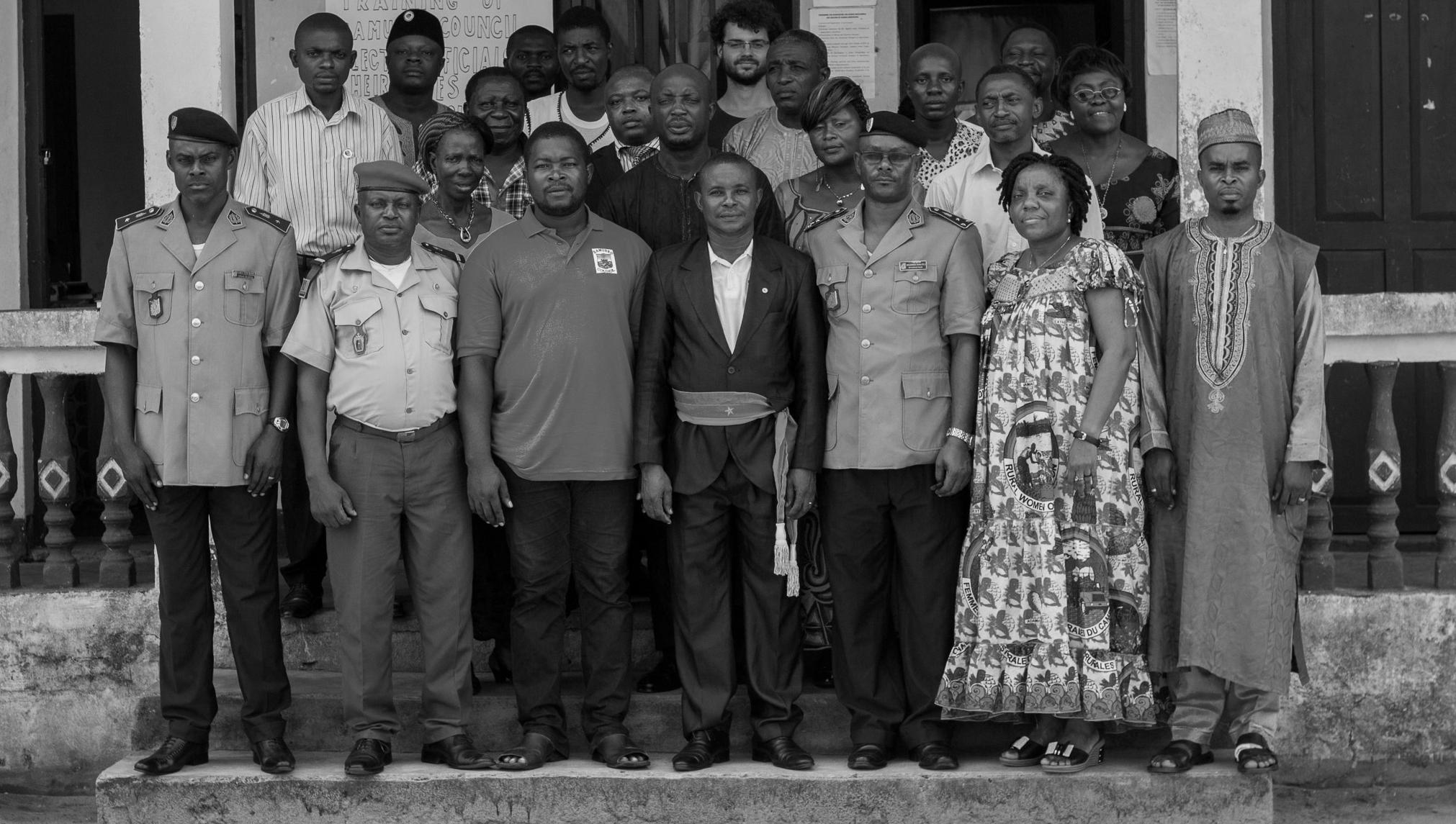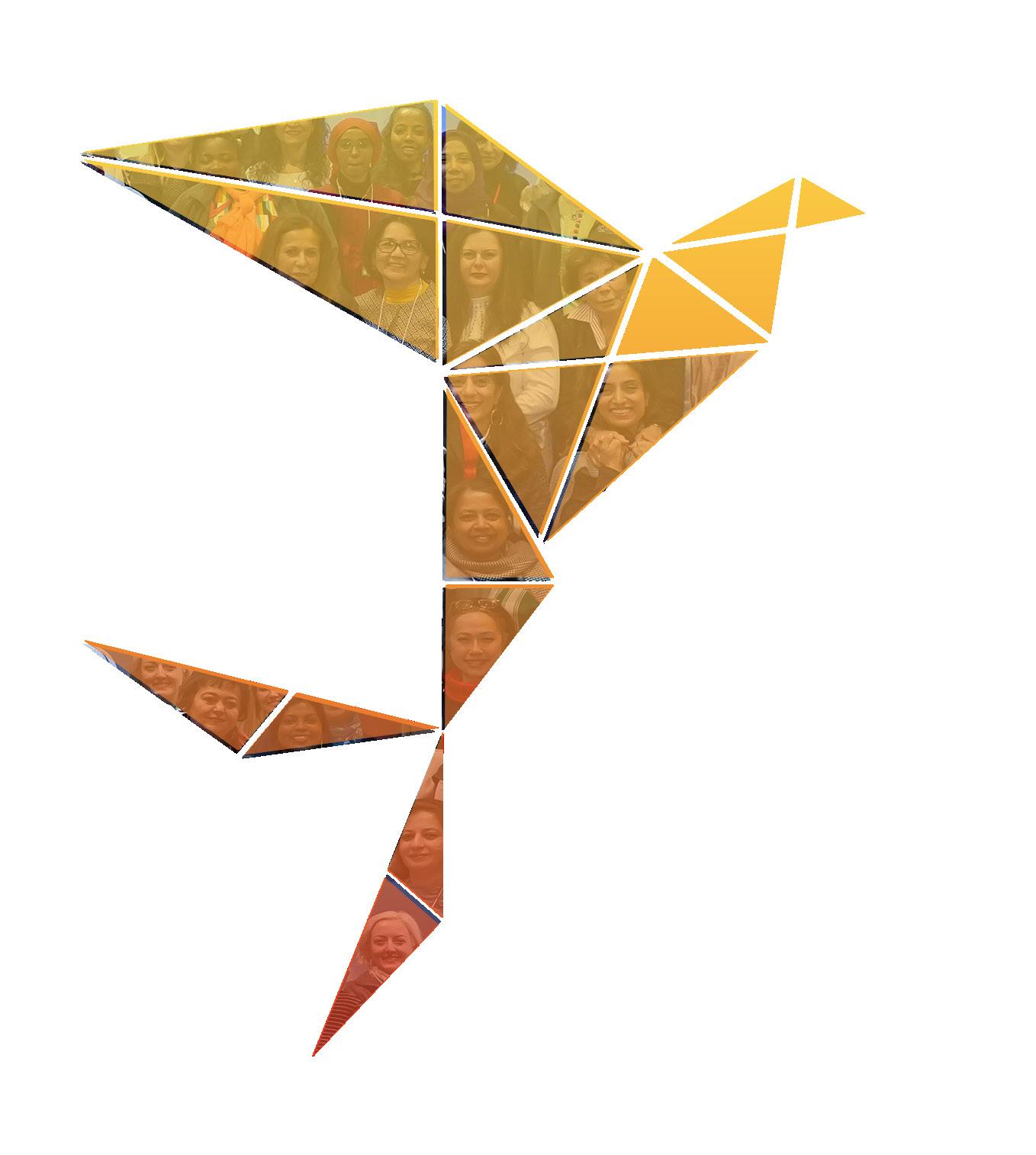
10 minute read
Conclusions and Recommendations
CONCLUSIONS
With conflicts and identity-based extremisms pulling apart the social fabric of societies, most people feel a strong tendency to withdraw into their own comfort zones and communities. But this further weakens the ability of pluralistic societies to reform and strengthen. Peacebuilders are the few individuals who not only imagine an alternative and inclusive future but also dare to become the change they seek to bring. Like any bridge, once they exist and create pathways for others to also engage across the lines of conflict, they can be walked over and taken for granted. But, when negative forces aim to disrupt this engagement, they target the bridges first.
With increasingly close civic space, rising authoritarianism, mainstreaming of extremisms, and the corresponding breaking down of trust, it is urgent and necessary to recognize and celebrate the existence and work of peacebuilders. Their approach and vision are inspirational, and also a critical antidote to the cynicism and apathy that can prevail when people have forgotten or never known peace within pluralistic societies and states. But peacebuilding is difficult. It is a mindset, an emotional journey, a daily, weekly, year-on-year effort and often a struggle to persist. It cannot be sustained by a handful of individuals and specialized networks alone. A wider movement and global public engagement are essential.
Twenty years ago, women building peace brought visibility to their work by successfully advocating for the UN Security Council’s recognition of their contributions. Now, it is time to acknowledge and respect the unique combination of values, characteristics, strategies and tactics that together define women peacebuilders as critical actors working in conflict settings on conflicts.
They are negotiating or mediating with armed groups and governments to end violence in formal and informal spaces. They focus on the rights and protection of civilian populations, particularly the most marginalized. They work on sustaining and building peace. It is dangerous work because they are exposing themselves to threats and ostracization at a time when people, even their own families and communities, are entrenched in their positions. These women are the heart and soul of the 1325 agenda, and they are a missing piece of contemporary peacemaking. It is time to ensure that they have their rightful place secured as independent actors and delegations at every stage of the peace process and every level of effort being undertaken to prevent, mitigate and resolve conflicts affecting their countries.
Below are 10 practical recommendations, including many based on existing precedence, to enable this shift.
Operational Guidance to Guarantee the Participation of Women Peacebuilders in Track One Peace Processes
In 2000, women peacebuilders mobilized to demand recognition and inclusion in peace and security processes, resulting in the adoption of United Nations Security Council Resolution (UNSCR) 1325 (2000) on women, peace and security (WPS). The resolution called for “support to women’s local peace initiatives” and the participation of women in peace and security decision making. Twenty years on, there is some progress. Over 80 countries have national action plans committing to women’s inclusion; regional women mediators’ networks have emerged globally; a handful of women are being appointed to official delegations to peace talks; the United Nations (UN) has appointed gender advisors to its Mediation Standby Teams; and envoys have created Civil Society Support Rooms and Women’s Advisory Boards to accompany Track One peace processes. While these models provide some space for engagement, they are by definition limited and do not guarantee direct and equal participation or representation of women peacebuilders in peace processes.
As research shows, this exclusion has a direct negative impact on the outcomes and the sustainability of peace agreements.
To improve the outcomes of existing peace processes and to mark the 20th anniversary of the WPS agenda, governments, multilateral organizations, and others engaged in the field of mediation and peacemaking need to change their standard practices. Here are 10 steps that mediation teams and governments supporting peace processes can take at each stage of the peace process to ensure inclusive and gender-responsive processes that have a better chance of sustainable peace.
1. Support independent women peacebuilder delegations to take part in peace talks.
Precedence: At the Somali National Peace Conference in Arta, Djibouti (2000), the UN invited Somali women peacebuilders to observe the peace talks among the five clans all represented by men. The women united across clans as the “Sixth Clan,” referencing the clan-based design of the conference. They negotiated with the men to secure their seat at the table as an independent delegation and as signatories to the agreement.
Precedence: In 1996, as the Northern Ireland peace talks were beginning, the mediator, Senator George Mitchell, called for an all-party process that would include the ten most popular political parties. Catholic and Protestant women’s rights and peace activists united to form a new party, the Northern Ireland Women’s Coalition, and came 9th in the elections, thereby securing their seat at the table. They introduced issues such as police, prison, and education reform to the agenda and played a pivotal role as internal mediators between the major parties when negotiations stalled. They were also crucial in mobilizing the public’s vote in the referendum to continue the talks.
Design inclusive processes where women and other marginalized groups have fair representation.
Precedence: In facilitating the 2012-2014 Yemen National Dialogue Conference (NDC), the UN heeded the call for inclusivity and helped create a process that included political and tribal leaders alongside youth and women’s civil society movements. The NDC comprised 28% female participation. There was an all-woman delegation and a minimum 30% quota for women’s participation in the delegations of other parties. Women chaired three of the nine working groups and comprised 25% of the Consensus Committee.
Convene meetings early on, encouraging systematic interactions from the start of the process so relations are built:
Between women peacebuilders and the envoy/mediator, and Between women peacebuilders and the negotiating parties. Precedence: As common practice, Norwegian mediation teams meet with various stakeholders, including women, before an official process starts. Throughout the process they engage on issues like inclusion and rights, particularly with those that are likely to be the formal parties. A gendered conflict and actor analysis is undertaken and targeted support for relevant women’s peace organizations and WPS actors is provided.
4.
Invite women as official observers and convene the women to negotiate on the issues on the agenda, come up with negotiated solutions to share with armed actors, and encourage them to adopt solutions.
Precedence: In Burundi in 1999, President Nelson Mandela (mediator), UNIFEM, and the Mwalimu Nyerere
Foundation supported an all-party women’s peace conference, bringing together more than 50 women representatives from the 19 Burundian groups involved in the peace negotiations. The women discussed and agreed on gender-specific demands including the inclusion of a women’s charter in the Constitution; measures to ensure women’s security; women’s rights to land, inheritance, and education; and an end to impunity for genderbased war crimes and domestic violence. Mandela subsequently presented the negotiated recommendations to the 19 negotiating parties, who accepted all requests.
5.
Invite women peacebuilders to regularly speak to delegations about issues on the negotiation agenda—such as ceasefires, power/responsibility sharing, and security sector reform—and what they expect to see coming out of the process.
Precedence: In 2002, in advance of the Sun City talks, UNIFEM assisted Congolese women to meet with women from South Africa, Guatemala, and Uganda who had experience in peace negotiations. The women were later able to contribute substantively to the agendas of several commissions (defense and security, political and judiciary, financial and economic, humanitarian, social and cultural, peace and reconciliation) and provide technical assistance to the Facilitator’s office in the last round of negotiations.
6.
Provide all delegates with gendered tools and training, including gendered briefing papers on all thematic topics on the agenda, so delegates understand how women and men are affected by and respond to conflict, and what expertise the peacebuilders bring to the table.
Precedence: During the Colombian peace process, the UN’s Mediation Standby Team produced gendered briefing notes for the Norwegian envoy on each of the topics on the agenda, including Disarmament, Demobilization,
Reintegration (DDR); land issues; and victims’ rights. Fund women peacebuilders early, throughout the process and, during implementation of agreements.
This enables them to carry out consultations, draft statements and papers, and engage substantively in the process from the start and in the implementation and monitoring of accords. Refer to their outputs to inform and shape the agenda and process, as well as in discussions with belligerent parties, as precedence in actions 4 and 5 show.
8. Allow flexibility for ongoing grants or provide new additional “rapid response” funding to women peacebuilders to enable them to travel on short notice and participate in peace processes.
Precedence: In 2019, ICAN’s Innovative Peace Fund (IPF) and Better Peace Initiative (BPI) mobilized within 16 days to provide financial support (travel, accommodation, and per diems) and strategic advising (messaging and statement input) to Cameroonian women to enable them to engage in the National Dialogue.
9. Assist with issuing and expediting visas to enable last-minute travel to peace talks/ pre-talks, provide other travel support (including transportation, accommodation, and per diems), and assist in obtaining security clearances and access.
Precedence: In 2002, as Canada’s Special Envoy for Peace in Sudan, Senator Mobina Jaffer, with the support of mediator Salim Salim (former President of Tanzania), was able to insist that 17 Darfuri women be brought to the peace talks. By building rapport with the Arab League and the African Union, Jaffer was able to change the dynamics of the process despite the initial refusal by male negotiators to include women.
Precedence: In 2019, the European Union (EU) included Yemeni and Syrian women peacebuilders in its delegation to the UN Commission on the Status of Women (CSW), enabling them to secure visas to the United States that would otherwise not have been issued. The peacebuilders were able to address and engage with a wide array of UN, member state, and US government officials, as well as the global NGO community.
10. Before committing funding or political support, insist on the inclusion of women peacebuilders and consult with women peacebuilders to determine the viability and vulnerabilities of agreements. Don’t commit support if delegations are not inclusive or if agreements enable, validate, or reinforce violence, corruption, discrimination, or exclusion.
Precedence: In May of 2020, the Council of the European Union concluded that the EU “will condition its future political and financial support to ensure that republican, democratic, and values-based principles are protected and further promoted”50 within the Afghanistan Peace Process. In declaring their support for a negotiated political settlement, the European Union remains committed to effectively enhancing governance and strengthening Afghan institutions in order to foster a sustainable peace. Additionally, the EU urges the settlement to ensure the democratic and fundamental freedoms of all Afghan citizens, particularly women, children, and minorities. These groups must be protected and strengthened to contribute to “the economic, social, political, and development achievements of the past 19 years.”51 Furthermore, the European Union reaffirmed alignment with United Nations Security Council Resolution 1325, highlighting the “importance of meaningful participation of women in all peace initiatives including formal and informal peace negotiations.”52
Pressuring women peacebuilder coalitions to channel their concerns to the peace table through the warring parties can be harmful. First, it politicizes the issues that women raise, turning the lives and well-being of abductees, for example, into a political bargaining chip. Second, it can compromise the integrity and independence of women peacebuilders—as active citizens from war-affected communities—if they are perceived to be co-opted by one side. We are peace actors working in and on the conflict for the benefit of the people, not the political elite.
- Rasha Jarhum, Peace Track Initiative, Yemen







